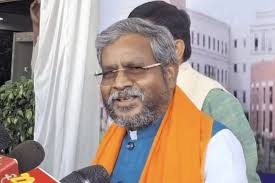Got no ambulance for hours, say parents of Jharkhand girl who died after fall; Opposition slams govt ‘inaction’

In a deeply upsetting incident from Jharkhand’s Garhwa district, an 8-year-old girl tragically died after her family waited hours for an ambulance. Despite several calls to emergency services, help never arrived in time. Now, the girl’s parents are speaking out, holding the system responsible for her death. Meanwhile, opposition parties have launched a sharp attack on the state government, calling the failure “unforgivable.”
The Day Everything Went Wrong
The incident occurred when the girl fell from a height while playing outside her home. She was severely injured and needed urgent medical help. Her parents immediately dialed the government ambulance helpline and continued to call repeatedly. However, no vehicle arrived for several hours.
“We kept calling, but they gave us excuses. We were helpless,” said her father, holding back tears. “If an ambulance had come sooner, our daughter might still be alive.”
Eventually, the family borrowed a vehicle from a neighbor and rushed her to the nearest hospital. Sadly, doctors declared her dead on arrival.
Anger Erupts in the Community
As news of the girl’s death spread, villagers gathered in protest. Many blocked roads and surrounded the local health center. They shouted slogans and held banners demanding justice for the family.
“This is not just about one girl,” said a schoolteacher from the village. “For years, we’ve been suffering because ambulances never arrive on time. Today, a child paid the price.”
The protestors also raised concerns about poor mobile networks and lack of infrastructure. According to them, such delays have become all too common in the region.
Political Storm Breaks Out
Soon after the tragedy, opposition parties began pointing fingers at the state government. Former Chief Minister Raghubar Das strongly criticized the ruling coalition, calling the situation “a shameful collapse of basic services.”
He said, “This isn’t just a technical failure — it’s a moral one. When a child dies because a government ambulance doesn’t show up, that’s criminal negligence.”
Congress leader Geeta Koda raised the issue in the state assembly. She demanded an immediate inquiry and public release of ambulance response times across the state.
“People in rural Jharkhand have been abandoned. It’s time the government wakes up,” she said.
Government Orders Inquiry, Promises Accountability
Under mounting pressure, the Jharkhand government ordered an official probe into the incident. The state health department confirmed that a three-member team would investigate the matter and check all emergency call logs from that day.
Health Minister Banna Gupta expressed his condolences and assured strict action. “This is a tragic incident. If any official or system failure is found, we won’t spare those responsible,” he said.
While this may sound reassuring, many citizens remain skeptical. After all, similar promises have been made in the past — with little follow-up action.
A Symptom of a Larger Problem
Public health experts say this incident reflects broader issues plaguing India’s rural healthcare system. Despite the presence of ambulance networks on paper, the reality on the ground tells a different story.
Dr. Shalini Verma, a Ranchi-based public health specialist, explained: “In most districts, one ambulance serves several villages. If a driver isn’t available or the roads are bad, delays become inevitable.”
In addition to equipment shortages, staffing problems also play a major role. Some health centers operate without trained personnel, making emergency coordination difficult.
“Even when vehicles are available, there’s no guarantee they’ll be dispatched quickly. We need better systems, not just more vehicles,” she added.
The Family Seeks Justice and Reform
Back in Garhwa, the girl’s family continues to grieve. They have asked the government for an official apology and financial support. Local activists have stepped in to help them file a legal complaint.
“We want answers,” said a community leader who is assisting the family. “If this doesn’t lead to reform, her death will have been in vain.”
He also called on the government to set up a permanent emergency health outpost in the village. According to him, this is the only way to ensure such tragedies don’t repeat.
Calls for Concrete Action
Social groups and civil society organizations are urging the state to go beyond promises. They want practical steps such as:
- Dedicated ambulances for each panchayat
- Real-time GPS tracking of emergency vehicles
- Mandatory response-time audits
- Regular training for emergency operators and health staff
“Expressing sympathy is not enough anymore,” said Arvind Sinha, a senior health rights activist. “If the government really cares, it must fix the root of the problem.”
Conclusion
The death of a young girl due to a preventable delay in emergency medical care has shaken an entire community in Jharkhand. Her parents continue to mourn, but they are also demanding justice. Meanwhile, political parties argue, probes are ordered, and promises are made. The question remains: will this lead to real change, or will it become just another forgotten tragedy?






